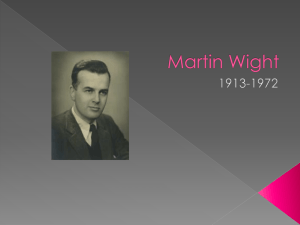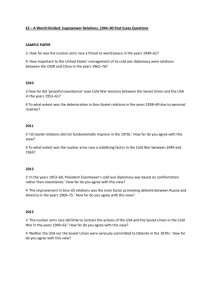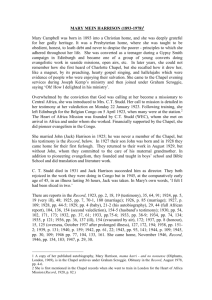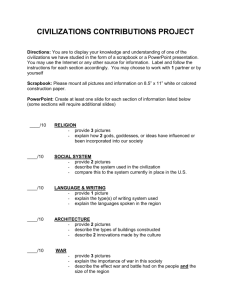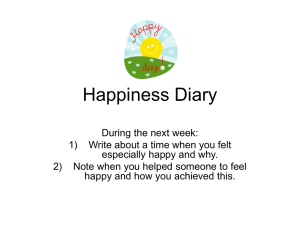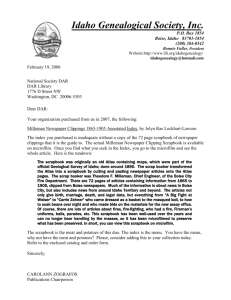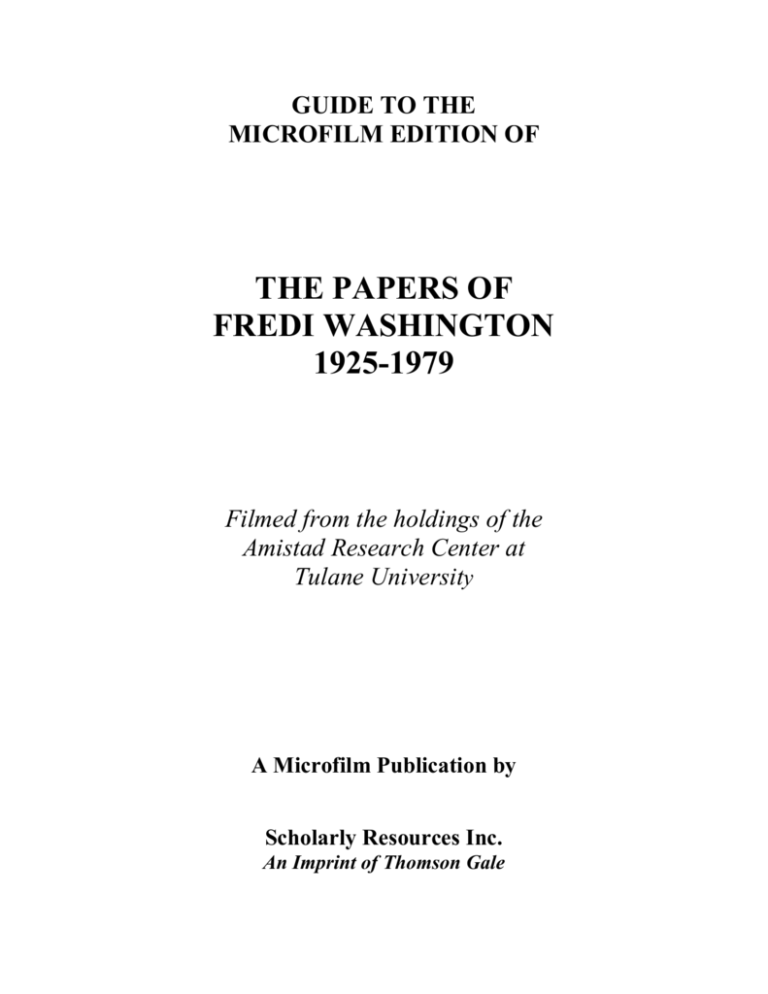
GUIDE TO THE
MICROFILM EDITION OF
THE PAPERS OF
FREDI WASHINGTON
1925-1979
Filmed from the holdings of the
Amistad Research Center at
Tulane University
A Microfilm Publication by
Scholarly Resources Inc.
An Imprint of Thomson Gale
Scholarly Resources Inc.
An Imprint of Thomson Gale
12 Lunar Drive, Woodbridge, CT 06525
Tel: (800) 444-0799 and (203) 397-2600
Fax: (203) 397-3893
P.O. Box 45, Reading, England
Tel: (+44) 1734-583247
Fax: (+44) 1734-394334
ISBN: 0-8420-4400-0
All rights reserved, including those to
reproduce this microfilm guide or any parts
thereof in any form
Printed and bound in the
United States of America
2005
Table of Contents
Note to Researcher, iv
-1994, v
Scope and Content of the Collection, vii
Index of Programs, x
Index of Correspondents, xii
Reel Contents, Papers of Fredi Washington, 1925-1979, 1
Note to Researcher
This collection was processed under a grant from the National Endowment for the
Humanities.
Copyright to these papers has not been assigned to the Amistad Research Center.
It is the responsibility of an author to secure permission for publication from the holder of
the copyright to any material contained in this collection.
iv
Biographical Notes
Fredi Washington, 1903-1994
(a.k.a. Mrs. Hugh Anthony Bell)
[actress, dancer, singer, casting consultant, journalist, and equal rights activist]
1903
born Fredericka Carolyn Washington on December 23 in Savannah,
Georgia
father: Robert T. Washington; deceased 1965
mother: Harriet Walker Ward Washington; deceased 1915
stepmother: Gertrude Washington; deceased 1963
1922-1926
chorus dancer in Shuffle Along and at Club Alabam’
1926
played feminine lead in Black Boy opposite Paul Robeson
1927-1928
formed ballroom dance team Moriet and Fredi, which played New York
supper clubs and toured European cities
1929-1930
dancer in musical Great Day; feminine lead in musical Black and Tan;
dancer in musical revue Hot Chocolates
1930-1931
role in musical drama Singin’ the Blues; role in Sweet Chariot
1932
southern dance tour with Eubie Blake and Noble Sissle’s orchestra; dance
team featured with Duke Ellington and orchestra in Chicago and other
cities
1933
feminine lead in Run, Little Chillun! (drama with music); feminine lead in
musical short with Cab Calloway; lead opposite Paul Robeson in film
Emperor Jones; female lead in Drums in the Jungle (filmed in Kingston,
Jamaica, British West Isles)
married Lawrence Brown, trombonist with Duke Ellington and son of a
Methodist minister
1934
featured in Imitation of Life as adult Peola; won 1934 Academy Award
1935
personal appearance tours in connection with Imitation of Life
1937
one of the founders of the Negro Actors Guild (NAG); served as first
executive secretary
1937-1938
lead in One Mile from Heaven opposite Bill Robinson
v
1939-1941
supporting role in Mamba’s Daughters starring Ethel Waters (scenes
from play produced for television by RCA)
1942-1947
theater editor and columnist for the People’s Voice, published in New
York (Adam Clayton Powell Jr., editor); second female lead in
adaptation for Negro cast of Lysistrata; participant in special events
program for the National Urban League
1948-1951
feminine lead in A Long Way from Home; served nine-month tenure
as executive secretary of NAG; appeared as guest on the television show
The Goldbergs; served as administrative secretary for the Joint Actors
Equity and Theater League Committee on Hotel Accommodations for
black performers throughout the states; registrar for Howard Da Silva’s
School of Acting, New York
1949
cast in How Long Till Summer
1950
presented a scroll by the Committee for the Negro in the Arts for
outstanding contributions as an artist
1951
divorced Lawrence Brown
1952
married Dr. Hugh Anthony Bell, dentist; moved to Stamford,
Connecticut
1970
widowed
1975
inducted into Black Filmmakers Hall of Fame
1979
recipient of CIRCA Award for lifetime achievement in the performing
arts
1994
died at age 90 on June 28 in Stamford
vi
Scope and Content of the Collection
This collection was acquired as a gift in three deposits from Fredi Washington.
The two acquired in 1975 have been interfiled in a single arrangement. The thirteen items
comprising the 1979 addition are filed as one unit at the end of Box 2 and pertain to the
career of the donor and other persons in the performing arts.
Approximately one hundred items of correspondence from 1933 to 1979 are
contained in the Papers of Fredi Washington. The correspondence includes letters (six of
which are outgoing), telegrams, cards, notes, and memoranda. The arrangement is
chronological except for the order of congratulatory telegrams received during the
performance of Lysistrata (1946) and How Long Till Summer (1949). These are
organized alphabetically by sender within their respective folders.
Most of the correspondents are represented by a single item, and no one is
represented by more than four items. The bulk of the correspondence is from the 1940s;
there are no letters during the 1960s. Letters from the mid-1930s include several items of
fan mail. Also, some writers of this period expressed their views on passing for white as
an option for those of African descent who did not possess obvious characteristics that
identified them as such. Fredi Washington’s role as Peola in the film Imitation of Life
generated interest on the subject of passing. Other letters, however, voiced Fredi’s strong
opinion on discrimination in the theater and stereotypes in casting. Still other
correspondence pertained to honors bestowed upon the actress, and most letters dating
from the 1970s are in this latter category.
Notable correspondents include Countee Cullen, Harlem Renaissance luminary
and playwright; Ossie Davis, actor; Owen Dodson, writer; Duke Ellington, composer and
band leader; Mary Garden, operatic star; Dorothy Heyward, playwright; Edith Isaacs,
theater historian; Isabel Powell (Mrs. Adam Clayton Powell, Jr.), sister of Fredi and an
actress prior to her marriage; and Walter White, author and civic activist.
Within this collection, items not relating to correspondence include an important
group of clippings dating from 1937 to 1979. These clippings have a dual interest
because they contain reviews of the various productions in which the actress appeared, as
well as feature articles on some of her fellow performers. Fredi was cast in dramas and
musicals that included notables such as Ethel Waters, Paul Robeson, and J. Rosamond
Johnson. Etta Moten starred in one of the comedies in which Fredi had a part, and Noble
Sissle, Eubie Blake, Duke Ellington, and other show business greats were among the stars
whose paths also crossed Fredi Washington’s. The clippings provide information about
many of these contacts.
On various occasions, one of the performers with whom the actress had similar
interests was J. Rosamond Johnson. In 1941 he marked fifty years in the business and had
gained recognition as a composer, author, vaudeville and musical comedy star, director,
producer, and actor. Many people associate the Johnson brothers with the so-called Negro
National Anthem; however, a December 19, 1939, clipping from the Detroit News,
written by George W. Stark under the byline “We Old Timers,” provides an informative
account of Johnson’s theatrical career. Fredi and Johnson had parts in Mamba’s
Daughters. When picketing the theater where the play was being presented threatened the
jobs of the cast, including the black performers working there, he and Fredi appealed to
the leaders of the movement and avoided further confrontation. Eleanor Roosevelt’s
vii
column, “My Day,” in the Washington, D.C. News for January 25, 1940, expressed the
First Lady’s disapproval of crossing picket lines. This article is included in the scrapbook
(Box 3).
The columns that Fredi wrote for the People’s Voice are available in the clippings,
and some of them, written under “Headlines—Footlights” in 1943 and 1944, have been
preserved. Her purpose in writing was “to provoke progressive thought, to help people of
the theater . . . and to criticize those of us who need it.” Her columns centered on black
performers in the legitimate theater, concert, screen, radio, and behind-the-scenes
organizations.
A substantial number of the clippings are reviews and criticisms of Fredi’s
performances. Typical of the complimentary reviews that followed her performances was
one from the St. Louis Post-Dispatch for November 7, 1939, in which Calvin McPherson
wrote that “Fredi Washington, the grown up Lissa, is perhaps the most talented Negro
actress in the business.”
Two categories of programs, spanning approximately thirty years but clustering in
the 1940s, are also included in the general arrangement. The first group is for
performances in which Fredi appeared; the second is for collected programs. Two of the
earliest programs date from the mid-1920s. One is a souvenir program from Club
Alabam’ where Fredi was a dancer; the other is for a 1926 production of Black Boy at the
Stamford Theater. This three-act play starred Paul Robeson opposite Fredi. Several
Robeson items are included in this collection, and they document a continuing respect
and admiration for the man and artist for whom neither time nor circumstance has
dimmed.
Other programs of interest include one for a 1943 Marian Anderson concert (it
bears the autograph of the famed contralto), and another for one of Duke Ellington’s
concerts contains penciled comments by Fredi; both performances were held at Carnegie
Hall. Her first husband, trombonist Lawrence Brown, had been a member of Ellington’s
orchestra for fourteen years when the group played Carnegie Hall in 1946.
Although the photographs were not microfilmed, Box 3 contains approximately
twenty black and white photos. These pictures document Fredi’s activities and include
several dating from the mid-1920s (the earliest in this collection) of her with Al Moore,
her partner of the ballroom dance team Moriet and Fredi.
The next decade in the actress’s career is represented by photographs from the
1930s of releases for Imitation of Life and a group picture with Bill Robinson; his wife,
Fannie; the Adam Clayton Powells; and Fredi at 20th Century Fox Studios after the
completion of One Mile from Heaven. Photos from the 1940s show Fredi at an art
exhibit, in the uniform of the Women’s Voluntary Service during World War II, and at a
banquet with members of the Negro Actors Guild. Among the individual photos of Fredi
are two undated ones by Carl Van Vechten. In addition, this collection contains several
other undated photos, both group and individual, as well as two of Fredi’s sister, Isabel.
Also included in the acquisition are seven scripts, two of which are for the
Cullen/Bontemps 1946 musical St Louis Woman. The scripts generally seem to be among
those submitted to the actress for her consideration, including one written by Dorothy
Heyward about Denmark Vesey’s rebellion and called “Set My People Free,” and another
by Paul Peters about the Nat Turner insurrection. Items in the collection indicate that
Robeson was being considered for the lead in Heyward’s play. Such scripts were
viii
especially of interest to Fredi because of her objection to any role that depicted blacks as
subservient or comic rather than as heroes. However, St. Louis Woman was produced,
and Fredi and Walter White were among those who believed that the musical perpetuated
an undesirable portrayal of blacks.
Although materials dating from the 1960s are generally sparse in this collection;
the Negro Actors Guild yearbook for 1961 is an interesting and important item from that
period. Among the deceased, it lists the organization’s historian, Harold Jackman, and
Muriel Rahn, a member of the executive board. Fredi was a founding member of the
Guild and its first executive secretary. Noble Sissle, of Sissle and Blake, was its first
president, and he served in that capacity for twenty years.
Notable items from the 1970s pertain to honors conferred on Fredi or her
acquaintances. One of the leaflets lists the first group to be elected to the Theater Hall of
Fame in 1972. Two of the 122 persons so honored were special to Fredi; they were Paul
Robeson and Bert Williams. Other items pertain to Fredi’s induction into the Black
Filmmakers Hall of Fame in 1975 and include an invitation to a dinner dance, brochures
for the 1974 and 1975 awards named in honor of Oscar Micheaux, and a small group of
items relating to Fredi’s nomination for the CIRCA—Life Achievement Award in 1979.
The Micheaux Award was conferred in Oakland, California, and the CIRCA Award was
presented in Detroit.
The scrapbook contains clippings, letters, programs, announcements, and
photographs. The clippings are predominantly from newspapers and are reviews of the
files and stage plays in which Fredi appeared. The items from the 1920s mostly pertain to
her Club Alabam’ period and to the cabaret dance duo that she and Al Moore formed.
There are also items from both the European and American press. Publicity and reviews
for appearances of the team in Paris, Dieppe, Hamburg, and Philadelphia comprise a
majority of the items from this decade.
The bulk of the scrapbook items are from the 1930s. Especially interesting are
those for Sweet Chariot (based on Marcus Garvey’s “back-to-Africa” movement),
Imitation of Life, and Mamba’s Daughters, the latter of which debuted in 1940 and was
seen by Eleanor Roosevelt at a benefit performance. For her role in Mamba’s Daughters,
George Jean Nathan named Fredi Washington “best young colored dramatic actress.”
ix
Index of Programs
[B, box; f, folder]
-AAlabam’ Fantasies, ca. 1925—B1, f9
All American Band, January 18, 1944—B1, f10
American Negro Theater Studio Group. See Anna Lucasta
American Youth Orchestra. See Dixon, Dean
Anderson, Marian, January 3, 1943 (autographed); December 30, 1945—B1, f10
Anna Lucasta, June 16, 1944—B1, f10
-BBeavers, Louise, May 8-9, 1935, in Imitation of Life—B1, f9
Black and Tan, March 24 (ca. 1929)—B3, Scrapbook
Black Boy, September 17-18, 1926—B2, f10
-CCommittee for the Negro in the Arts. See Just a Little Simple
-DDavis, Sammy Jr., April 2, 1956, in Mr. Wonderful—B1, f11
Dixon, Dean, May 18, 1945—B1, f10
-EEllington, Duke, January 23, 1943; November 24, 1946; January 21, 1951 (2)—B1, f10;
March 24 (ca. 1929)—B3, Scrapbook
-GGaumont Palace, December 15, 1927—B3, Scrapbook
-HHansberry, Lorraine. See A Raisin in the Sun
Highlights of the Empire, May 24, 1953—B1, f9
Holt, Stella. See Jerico-Jim Crow
Horne, Lena, March 16, 1959, in Jamaica—B1, f11
How Long Till Summer, December 15-17, 1949; December 27, 1949—B1, f9
Hughes, Langston. See Jerico-Jim Crow and Just a Little Simple
-IImitation of Life, May 8-14, 1935—B1, f9
-JJamaica, March 16, 1959—B1, f11
Jerico-Jim Crow, n.d.—B1, f10
Johnson, J. Rosamond, January 23, 1939, in Mamba’s Daughters—B1, f9
Just a Little Simple, n.d.—B1, f9
x
-KKitt, Eartha, April 22, 1957, in Shinbone Alley—B1, f11
-LLost in the Stars, October 31, 1949—B1, f11
-MMcNeil, Claudia, September 16, 1957, in Simply Heavenly—B1, f11
Mamba’s Daughters, January 3, 1939—B3, Scrapbook; June 23, 1939—B1, f9
The Mariners, October 12, 1956—B1, f10
Memphis Bound, May 27, 1945—B1, f11
Mr. Wonderful, April 2, 1956—B1, f11
-NNegro Actors Guild of America, Inc., January 26, 1946—B1, f10
-OOthello, August 17-22, 1942—B1, f10
-PPankey, Aubrey (baritone), April 19, 1945—B1, f10
Le Petit Parisian, September 19, 1927—B3, Scrapbook
Poitier, Sidney, May 25, 1959, in A Raisin in the Sun—B1, f11
Porgy and Bess, March 16, 1953—B1, f11
-RA Raisin in the Sun, May 25, 1959—B1, f11
Robeson, Paul, September 17-18, 1926, in Black Boy—B2, f10; August 17-22, 1942, in
Othello—B1, f10
Robinson, Bill, May 27, 1945, in Memphis Bound—B1, f11
-SShinbone Alley, April 22, 1957—B1, f11
Simply Heavenly, September 16, 1957—B1, f11
Simms, Hilda Moses, June 16, 1944, in Anna Lucasta—B1, f10
Soldadera, November 2-5, 1950—B1, f9
Sweet Chariot, October 6, 1930—B3, Scrapbook
-WWaters, Ethel, January 23, 1939, in Mamba’s Daughters—B1, f9; May 24, 1953, in
Highlights of the Empire—B1, f9
White, Josh, in How Long Till Summer, December 27, 1949—B1, f9
Will Mastin Trio. See Mr. Wonderful
xi
Index of Correspondents
[(1), number of letters; B, box; f, folder]
-BBerry, Thomas, 1935 (1)—B1, f1
Bronesky, Leon, 1949 (1)—B1, f2
-CCage, Ruth, 1949 (1)—B1, f4
Calvin, Albert W., 1949 (1)—B1, f2
Carpenter, Charles, 1949 (1)—B1, f4
Carpenter, Charles, n.d. (1)—B1, f5
Carpenter, Thelma, 1949 (1)—B1, f2
Coles, Leslie E. (Mr. and Mrs.), 1949 (1)—B1, f2
Committee for the Negro in the Arts, 1949 (1)—B1, f4
Cullen, Countee, 1944 (2)—B1, f1
Cuney, Madge L., 1946 (1)—B1, f1
-DDavis, Ossie, 1946 (1)—B1, f3
Diamond, Freda, n.d. (1)—B1, f5
Dodson, Owen, 1946 (2)—B1, f1, f3
Donnelly, May E., 1939 (1)—B1, f1
Douglas, Melvyn, 1946 (1)—B1, f1
-E Ellington, Duke, 1946 (1)—B1, f3
-FFarrar, John, 1946 (1)—B1, f1
Feinberg, William, 1949 (1)—B1, f1
Fitzgerald, M. [Mary] Eleanor, 1935 (1)—B1, f1
Flecknoe, Mary, 1935 (1)—B1, f1
Folks at Home, 1949 (1)—B1, f4
Foxx, Dennis, 1979 (4)—B2, f10
Freedley, George, 1953 (4)—B1, f2
-GGarden, Mary, 1933 (1)—B3, Scrapbook
The Goldbergs, 1949 (1)—B1, f2
Goldblatt, Aaron, 1953 (1)—B1, f2
Gunzenhauser, Edward, 1935 (1)—B1, f1
xii
-HHahlo, Sylvia, 1949 (1)—B1, f2
Hambleton, T. Edward, 1946 (2)—B1, f1
Heyward, Dorothy, 1946 (1)—B1, f1
Hicks, Margot, Smith, 1974 (1)—B1, f2
Hicks, Hilda, n.d. (1)—B1, f5
-I Isaacs, Edith R., 1947 (1)—B1, f1
Israels, Josef II, 1933 (1)—B3, Scrapbook
-JJarrett, Jerry, 1949 (1)—B1, f2
Johnson, Ademola, 1949 (1)—B1, f2
Johnson, Hall. See Garden, Mary
Jones, Margo, 1946 (1)—B1, f3
-KKates, Bernard, 1949 (1)—B1, f2
Kellin, Mike, 1949 (1)—B1, f2
King, Mariano T., 1935 (1)—B1, f1
-LLandrum, James N., 1949 (1)—B1, f2
Linfield, Trudy, 1949 (2)—B1, f2
-MMcManus, Jack, 1946 (1)—B1, f3
Marcantonio, Vito, 1944 (1)—B1, f1
Margaret Mary, Sister, S.B.S. See Donnelly, May E.
Marvel, Arthur Dick, 1949 (1)—B1, f4
Marvin, Mike, 1949 (1)—B1, f4
Montgomery, Veronica, 1935 (1)—B1, f1
Morales, Conchita, 1935 (1)—B1, f1
Moss, Carlton, 1949 (1)—B1, f2
Murphy, Carl, 1946 (1)—B1, f1
My Dear Friend, 1935 (1)—B1, f1
Myers, Walter, 1933 (1)—B3, Scrapbook
-NNegro Actors Guild of America, Inc., 1949 (1)—B1, f4
-PPeg and Milton, 1946 (1)—B1, f3
People’s Voice (staff), n.d. (1)—B1, f5
xiii
-P- (continued)
Pincus, Joseph, 1949 (1)—B1, f2
Pinkney, Percy, 1975 (1)—B1, f2
Poston, Marie. See below
Poston, Ted, 1946 (1)—B1, f3
Potora, Irene, 1935 (1)—B1, f1
Powell, Isabel, 1946-1949 (2)—B1, f3, f4
Procter, Isabel, 1944 (1)—B1, f1
Progressive Party, 1949 (1)—B1, f4
-RRobeson, Paul, 1946 (1)—B1, f1
Robinson, Albert, 1935 (1)—B1, f1
Robinson, Fannie E. (Mrs. Bill), 1949 (1)—B1, f4
Rockmore, Robert. See Robeson, Paul
Ross, George, 1949 (1)—B1, f2
Russell, Charles, 1935 (1)—B1, f1
-SSalvation Army Omaha #1 Corps. See Sprake, Ellen Dean
Sansom, James, 1935 (1)—B1, f1
Schneider, Alan, 1948-1955 (2)—B1, f1, f4
Shapley, Harlow, 1949 (1)—B1, f2
Short, Robert, 1946-1952 (2)—B1, f2, f3
Smith, Darr, 1949 (1)—B1, f2
Sprague, Eva Jane, 1935 (1)—B1, f1
Sprake, Ellen Dean, 1935 (1)—B1, f1
-TTaylor, William, 1937 (1)—B1, f1
Thomas, Dearl, 1979 (1)—B2, f9
-V[________], Viola, 1949 (1)—B1, f2
-WWallace, Lee, ca. 1953 (1)—B1, f2
Ward, Toni, 1948 (1)—B1, f1
[Washington, Gertrude], 1953 (1)—B1, f2
Webster, Margaret, 1946 (1)—B1, f1
Wertz, Jack, 1979 (1)—B2, f9
White, Josh, 1948 (1)—B1, f4
White, Walter, 1933 (1)—B3, Scrapbook
xiv
-W- (continued)
Wilhelm, Elliot, 1979 (1)—B2, f9
Willett, Royal, 1935 (1)—B1, f1
Wolfe, Royal, 1949 (1)—B1, f4
-YYurka, Blanche, 1946 (1)—B1, f3
xv
THE PAPERS OF
FREDI WASHINGTON
1925-1979
Reels 1-2
The Papers of Fredi Washington, 1925-1979
Reel No. Box No.
1
2
1
2
Folder No. Contents
1
2
3
4
5
6
7
8
Correspondence, 1935-1948
Correspondence, 1949-1975, n.d.
Telegrams re: Lysistrata, 1946
Telegrams—re: How Long Till Summer, 1949
Cards, n.d.
Resumes, 1950, n.d.
Interviews—Radio (Typescript), 1946
Publicity—Announcements, Broadsides, Typescripts, ca.
1939, n.d.
9
10
11
12
Programs, 1925-1953, n.d.
Programs (Collected), 1942-1956, n.d.
Playbills, 1945-1959
Writings—Columns, Articles in the People’s Voice, etc.,
1947
13
14
15
16
17
18
19
20
21
22
23
24
Writings—Typescript, 1951
Photos, 1927-1950, n.d.
Invitations, 1975
Clippings—re: Fredi, 1937-1953, n.d.
Clippings (Photocopies), 1937-1957; Duplicates
Clippings—“Odds and Ends,“ 1943-1944
Clippings—Miscellaneous, 1937-1956, n.d.
Pamphlets—Black Filmmakers Hall of Fame
Yearbook—Negro Actors Guild, 1961
Brochures—re: Theater, 1959-1972
Scripts—“The Crystal Tree“ (musical)
Scripts—“The Goldbergs“ (television), 1949
1
2
3
4
5
6
7
8
Script—“Nat Turner,“ 1939
Script—“St. Louis Woman“ (Salisbury copy)
Script—“St. Louis Woman“
Script—“Set My People Free“ (Acts I and II)
Script—“Set My People Free“ (Act III)
Script—“Soldadera“
Synopsis—“No Way Out“
Collected items—Article, “Harlem’s Religious Zealots,“
1949
9
10
11
Biographical notes about other persons, n.d.
Sheet music, 1938
ADDITION, 1926-1979 (13 items)
1
The Papers of Fredi Washington, 1925-1979
Reel No. Box No.
2
3
Folder No. Contents
OVERSIZE ITEMS
Photos—Moiret and Fredi, 1920s [Not Filmed]
AFRA Bulletin—Stand By, 1947
Honors and Awards—Scroll, 1950
Writings—Column, 1943
Writings—Column, 1944; Article, 1951
Clippings—re: Fredi, 1939-1951, n.d.
Clippings and newspaper—re: Black Filmmakers Hall of
Fame, 1975
Clippings—re: Passing, 1945-1947
Clippings—Miscellaneous, 1942-1951
Scrapbook, ca. 1929-1940
Loose items removed from Scrapbook
2

